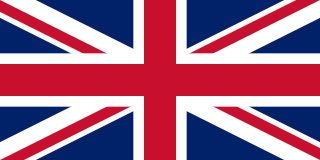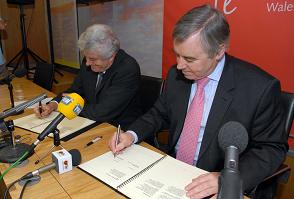Plaid Cymru is a centre-left to left-wing, Welsh nationalist political party in Wales, committed to Welsh independence from the United Kingdom. It campaigns on a platform of social democracy and civic nationalism. The party is a supporter of the European Union and is a member of the European Free Alliance (EFA). The party holds 4 of 32 Welsh seats in the UK Parliament, 12 of 60 seats in the Senedd, and 202 of 1,231 principal local authority councillors. Plaid was formed in 1925 under the name Plaid Genedlaethol Cymru and Gwynfor Evans won the first Westminster seat for the party at the 1966 Carmarthen by-election.

The secretary of state for Wales, also referred to as the Welsh secretary, is a secretary of state in the Government of the United Kingdom, with responsibility for the Wales Office. The incumbent is a member of the Cabinet of the United Kingdom.

The Senedd, officially known as the Welsh Parliament in English and Senedd Cymru in Welsh, is the devolved, unicameral legislature of Wales. A democratically elected body, it makes laws for Wales, agrees to certain taxes, and scrutinises the Welsh Government. It is a bilingual institution, with both Welsh and English being the official languages of its business. From its creation in May 1999 until May 2020, the Senedd was officially known as the National Assembly for Wales and was often simply called the Welsh Assembly.

The national flag of the United Kingdom is the Union Jack, also known as the Union Flag.

Elfyn LlwydPC is a Welsh barrister and politician. He was the Member of Parliament for Meirionnydd Nant Conwy in the House of Commons from the 1992 general election until its abolition in 2010, and then for its principal successor constituency of Dwyfor Meirionnydd from 2010 until his retirement in 2015. Llwyd was Plaid Cymru's Westminster parliamentary group leader.

Adam Robert Price is a Welsh politician who served as Leader of Plaid Cymru from September 2018 to May 2023. He has been the Member of the Senedd (MS) for Carmarthen East and Dinefwr since 2016, having previously been a Member of Parliament (MP) for the same Westminster constituency from 2001 to 2010.
In the United Kingdom, public holidays are days on which most businesses and non-essential services are closed. Many retail businesses do open on some of the public holidays. There are restrictions on trading on Sundays, Easter and Christmas Day in England and Wales and on New Year's Day and Christmas Day in Scotland. Public holidays defined by statute are called "bank holidays", but this term can also be used to include common law holidays, which are held by convention. The term "public holidays" can refer exclusively to common law holidays.

Politics in Wales forms a distinctive polity in the wider politics of the United Kingdom, with Wales as one of the four constituent countries of the United Kingdom (UK).
Welsh republicanism or republicanism in Wales is the political ideology that advocates for Wales to be governed by a republican system, as opposed to the monarchy of the United Kingdom.

Welsh independence is the political movement advocating for Wales to become a sovereign state, independent from the United Kingdom.

One Wales was the coalition agreement for the National Assembly for Wales between Labour and Plaid Cymru agreed to by Rhodri Morgan, First Minister of Wales and leader of Welsh Labour, and Ieuan Wyn Jones, leader of Plaid Cymru, on 27 June 2007. It was negotiated in the wake of the preceding National Assembly election which resulted in a large Labour plurality, but no majority. Labour and Plaid Cymru approved the document in separate votes on 6 and 7 July, respectively.

Plaid Cymru originated in 1925 after a meeting held at that year's National Eisteddfod in Pwllheli, Caernarfonshire. Representatives from two Welsh nationalist groups founded the previous year, Byddin Ymreolwyr Cymru and Y Mudiad Cymreig, agreed to meet and discuss the need for a "Welsh party". The party was founded as Plaid Genedlaethol Cymru, the National Party of Wales, and attracted members from the left, right and centre of the political spectrum, including both monarchists and republicans. Its principal aims include the promotion of the Welsh language and the political independence of the Welsh nation.
House prices increased in Wales during the Housing market crisis in the United Kingdom (2008). There has been political debate that this has contributed to a decline in the number of speakers of the Welsh language.

The 2007 National Assembly for Wales election was held on Thursday 3 May 2007 to elect members to the National Assembly for Wales. It was the third general election. On the same day local elections in England and Scotland, as well as the Scottish Parliament election took place. This election was preceded by the previous Assembly election in 2003.

In the United Kingdom, devolution is the Parliament of the United Kingdom's statutory granting of a greater level of self-government to the Scottish Parliament, the Senedd, the Northern Ireland Assembly and the London Assembly and to their associated executive bodies: the Scottish Government, the Welsh Government, the Northern Ireland Executive and in England, the Greater London Authority and combined authorities.

Unionism in Wales is the political view that supports a political union between Wales and the other countries of the United Kingdom. As well as the current state of the UK, unionism may also include support for Federalism in the United Kingdom and a United Kingdom Confederation.

Federalism in the United Kingdom aims at constitutional reform to achieve a federal UK or a British federation, where there is a division of legislative powers between two or more levels of government, so that sovereignty is decentralised between a federal government and autonomous governments in a federal system.

Welsh devolution is the transfer of legislative powers for self-governance to Wales by the Parliament of the United Kingdom. The current system of devolution began following the enactment of the Government of Wales Act 1998, with the responsibility of various devolved powers granted to the Welsh Government rather than being the responsibility of the Government of the United Kingdom.

Saint David's Day is currently not a bank holiday in Wales. Some Welsh politicians have proposed that St David's Day, a celebration of Welsh identity, observed on 1 March, be designated as a public holiday.















